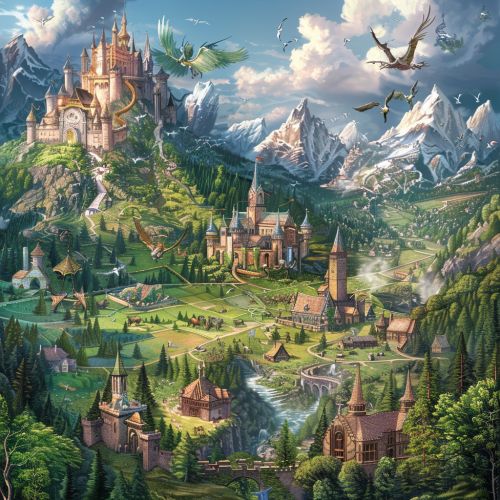The Elder Scrolls
The Elder Scrolls


The Elder Scrolls is a series of action role-playing open world epic fantasy video games primarily developed by Bethesda Game Studios and published by Bethesda Softworks. The series is known for its elaborate and richly detailed open worlds and its focus on free-form gameplay. The Elder Scrolls series has sold more than 58 million copies worldwide.
Development and History
The Elder Scrolls series began with the release of Arena in 1994. The game was initially conceived as a gladiatorial combat game but evolved into a full-fledged role-playing game (RPG) with a vast open world. The success of Arena led to the development of Daggerfall, which was released in 1996. Daggerfall introduced many features that would become staples of the series, including a highly detailed character creation system and a vast, procedurally generated world.
The third installment, Morrowind, released in 2002, marked a significant shift in the series. It featured a handcrafted world rather than a procedurally generated one, allowing for more detailed and unique environments. Morrowind was critically acclaimed for its deep lore, complex quests, and open-ended gameplay.
Oblivion, released in 2006, continued to build on the success of its predecessors. It featured improved graphics, more dynamic NPC interactions, and a more polished combat system. The game was praised for its immersive world and compelling storyline.
The fifth installment, Skyrim, released in 2011, became one of the most popular and influential games of its generation. Skyrim introduced a more streamlined user interface, a more flexible character progression system, and a vast, detailed world filled with diverse environments and creatures. The game received numerous awards and accolades and has been re-released on multiple platforms.
Gameplay Mechanics
The Elder Scrolls series is renowned for its open-world gameplay, allowing players to explore vast landscapes, interact with NPCs, and complete quests at their own pace. The games feature a first-person perspective, although a third-person view is also available.
Character Creation and Progression
Character creation in The Elder Scrolls games is highly detailed, allowing players to choose from various races, each with unique abilities and attributes. Players can customize their character's appearance, skills, and attributes. The series uses a skill-based progression system, where characters improve their abilities through use rather than leveling up in a traditional sense.
Combat and Magic
Combat in The Elder Scrolls series combines melee, ranged, and magical attacks. Players can use a variety of weapons, including swords, bows, and staves, as well as a wide range of spells. Magic is divided into several schools, such as Destruction, Restoration, and Conjuration, each offering different types of spells and abilities.
Quests and Exploration
Quests in The Elder Scrolls games range from simple tasks to complex, multi-part storylines. The main quest typically involves saving the world from a significant threat, but players can also engage in numerous side quests and join various factions, such as the Thieves Guild or the Dark Brotherhood. Exploration is a key aspect of the series, with players encouraged to discover hidden locations, dungeons, and treasures.
Lore and Worldbuilding
The Elder Scrolls series is set in the fictional continent of Tamriel, which is divided into several provinces, each with its own distinct culture and geography. The games are known for their deep lore, which is conveyed through in-game books, dialogues, and environmental storytelling.
Races and Cultures
Tamriel is home to various races, including Nords, Bretons, Redguards, Imperials, Dunmer, Altmer, Bosmer, Orcs, Argonians, and Khajiit. Each race has its own history, culture, and unique abilities. The interactions between these races and their respective cultures play a significant role in the series' storytelling.
Deities and Religion
Religion is an important aspect of The Elder Scrolls lore. The series features a pantheon of gods and deities, including the Aedra and Daedra. The Aedra are generally considered benevolent gods who created the world, while the Daedra are more chaotic and often malevolent beings. Worship of these deities varies among the different races and cultures of Tamriel.
Historical Events
The history of Tamriel is marked by significant events and conflicts, such as the Oblivion Crisis, the Great War, and the Dragon Crisis. These events shape the world and influence the storylines of the games. The series also explores the rise and fall of various empires, the struggles between different factions, and the impact of powerful artifacts and ancient prophecies.
Technical Aspects
The Elder Scrolls series has seen significant technical advancements over the years. Each game has introduced improvements in graphics, physics, and artificial intelligence.
Graphics and Engine
The early games in the series used the XnGine engine, which was later replaced by the Gamebryo engine for Morrowind and Oblivion. Skyrim introduced the Creation Engine, which allowed for more detailed environments, improved character animations, and more dynamic lighting and weather effects.
Modding Community
One of the unique aspects of The Elder Scrolls series is its active modding community. Bethesda has released modding tools for each game, allowing players to create and share their own content. This has led to a vast array of user-generated mods, ranging from simple cosmetic changes to entirely new quests and game mechanics.
Reception and Impact
The Elder Scrolls series has been critically acclaimed for its open-world design, deep lore, and immersive gameplay. The games have received numerous awards and have been praised for their innovation and influence on the RPG genre.
Sales and Popularity
The series has sold over 58 million copies worldwide, making it one of the best-selling video game franchises of all time. Skyrim alone has sold over 30 million copies and has been re-released on multiple platforms, including PlayStation, Xbox, and Nintendo Switch.
Cultural Impact
The Elder Scrolls series has had a significant impact on popular culture and has influenced numerous other games and media. The series' open-world design and emphasis on player freedom have become a benchmark for the RPG genre. The games have also inspired a range of merchandise, including novels, comic books, and tabletop games.
Future of the Series
Bethesda has announced the development of The Elder Scrolls VI, although details about the game remain scarce. The company has stated that the game will continue to build on the series' strengths, offering a vast open world and deep, immersive gameplay.
